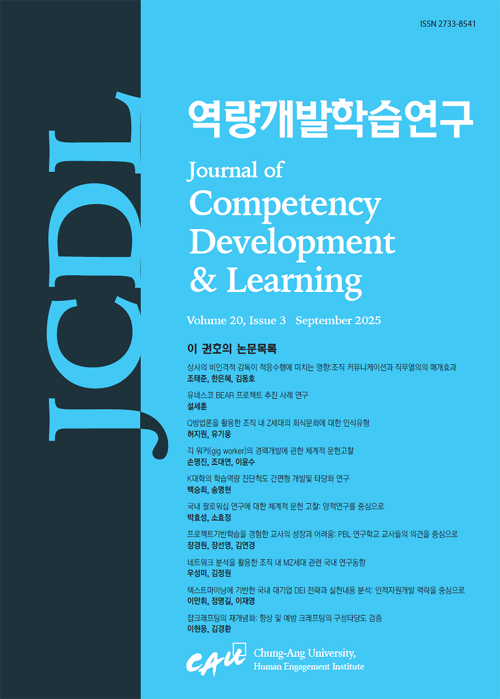- 영문명
- Research Trends Related to the MZ Generation within Organizations Using Network Analysis
- 발행기관
- 중앙대학교 휴먼인게이지먼트연구소
- 저자명
- 우성미(Sungmi Woo) 김정원(Jungwon Kim)
- 간행물 정보
- 『역량개발학습연구(구 한국HRD연구)』제20권 제3호, 223~251쪽, 전체 29쪽
- 주제분류
- 사회과학 > 교육학
- 파일형태
- 발행일자
- 2025.09.30

국문 초록
본 연구는 키워드 네트워크 분석을 활용하여 조직 내 MZ세대 연구동향을 파악하는 것을 목적으로 하였다. 이를 위해 2025년 4월 1일부터 15일까지 한국학술지인용색인(KCI)에서 자료수집을 실시하였고, 자료수집은 등재지와 등재후보지에 발표된 MZ세대 관련 논문을 대상으로 하였다. 수집된 논문을 검토하여 조직 내 MZ세대를 다루고 있는 연구들로 선별하여 최종 184편의 논문을 선정하였다. 선정된 논문으로부터 연구의 흐름을 확인하기 위하여 먼저 연도별 논문 수, 연구대상 현황, 836개의 키워드를 중심으로 출현빈도와 동시출현빈도를 분석하였다. 그리고 구글 코랩(Colab)을 활용하여 네트워크의 구조적 속성, 연결중심성, 근접중심성, 매개중심성, 하위 네트워크 분석을 실시하였다. 이직의도, 조직몰입, 직무만족, 공공봉사동기, 세대 차이, 일과 삶의 균형, 직무스트레스가 연결중심성, 근접중심성, 매개중심성이 모두 높은 키워드로 나타났다. 일부 키워드는 중심성 지표별로 다르게 나타났는데, 근접중심성에서 조직시민행동, 매개중심성에서 직무몰입, 셀프리더십, 변혁적 리더십이 높게 나타났다. 마지막으로 커뮤니티 분석결과 총 8개의 커뮤니티가 도출되었으며, 이상의 분석결과를 바탕으로 조직 내 MZ세대 연구의 시사점과 후속연구를 제언하였다.
영문 초록
This study aimed to identify research trends on the MZ generation within organizations using keyword network analysis. To this end, data collection was conducted from April 1 to 15, 2025, using the Korean Citation Index (KCI). The data collection targeted papers related to Generation MZ published in KCI-listed journals and KCI candidate journals. The collected papers were reviewed and filtered to select studies specifically addressing Generation MZ within organizations, resulting in a final sample of 184 papers. To identify the trends in the selected papers, we first analyzed the number of papers by year, the status of research subjects, and the frequency and co-occurrence frequency of 836 keywords. Then, using Google Colab, we conducted degree centrality, closeness centrality, betweenness centrality, and community analysis of the network. Keywords such as job turnover intention, organizational commitment, job satisfaction, public service motivation, generation differences, work-life balance, and job stress were found to have high degree centrality, closeness centrality, and betweenness centrality. Some keywords showed different patterns depending on the centrality measures: organizational citizenship behavior had high closeness centrality, while organizational commitment, self-leadership, and transformational leadership had high betweenness centrality. Finally, community analysis identified a total of eight communities, and based on the above analysis results, implications for research on the MZ generation within organizations and suggestions for future research were proposed.
목차
Ⅰ. 서론
Ⅱ. 이론적 배경
Ⅲ. 연구방법
Ⅳ. 연구결과
Ⅴ. 결론 및 시사점
참고문헌
해당간행물 수록 논문
참고문헌
최근 이용한 논문
교보eBook 첫 방문을 환영 합니다!

신규가입 혜택 지급이 완료 되었습니다.
바로 사용 가능한 교보e캐시 1,000원 (유효기간 7일)
지금 바로 교보eBook의 다양한 콘텐츠를 이용해 보세요!


